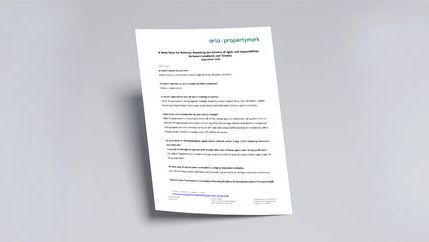Renters’ Reform Bill to abolish Section 21 in England
At the state opening of Parliament on 19 December 2019, the Queen’s Speech announced a Renters’ Reform Bill that will abolish the use of ‘no fault’ evictions by removing Section 21 of the Housing Act 1988 and reforming the grounds for possession.
Renters’ Reform Bill — Section 21 to be abolished
At the state opening of Parliament on 19 December 2019, the Queen’s Speech set out Boris Johnson’s Government’s “people’s priorities” announcing a Renters’ Reform Bill that will abolish the use of ‘no fault’ evictions by removing Section 21 of the Housing Act 1988 and reforming the grounds for possession.
What the UK Government is proposing:
- Abolishing the use of ‘no-fault’ evictions by removing Section 21 of the Housing Act 1988 and reforming the grounds for possession.
- Give landlords more rights to gain possession of their property through the courts where there is a legitimate need for them to do so by reforming current legislation.
- Work to improve the court process for landlords to make it quicker and easier for them to get their property back.
We believe that in the absence of any meaningful plan to boost the level of social housing in this country, the abolition of Section 21 will impact good landlords in the private rented sector who house the nation.
If Section 21 is scrapped, Section 8 must be reformed, and a new specialist housing tribunal created. Without this, supply will almost certainly fall which will have the consequential effect of raising rents and will further discourage new landlords from investing in the sector.
A new deal for renting: resetting the balance of rights and responsibilities between landlords and tenants
The UK Government launched a consultation in July 2019 seeking views on implementing the removal Section 21 in England, as well as improving Section 8 eviction grounds. We submitted a comprehensive response to the UK Government’s consultation on planned changes to the eviction process in England.
A new deal for renting consultation
We submitted a comprehensive 39-page document in response to the Government’s consultation on planned changes to the eviction process in England.
Changes to the current system should only take place following the development of specialist housing courts and mandatory grounds allowing landlords to regain possession of their property—they must be fair to both tenants and landlords.
To mitigate any negative impacts of the proposals, the Government must:
- Consider introducing a Housing Court to ensure that the proposals are workable or adequately resource and amend the existing Courts system.
- Use a technological solution, possession claims must be digitised and taken online.
- Look to make all grounds for possession, both existing and new, mandatory in order to effectively compensate for the removal of Section 21.
- Ensure automatic High Court Enforcement so landlords are granted an automatic right to have their Possession Order executed by a High Court Enforcement Officer.
- Implement a pilot scheme before a national rollout of the proposals to evaluate the effectiveness of the new system.
Section 21, Section 8 and Section 13
These common tenancy notices are Government prescribed forms available to download from their website. This resource offers a little more information into each one and where you need to go to download them.
Related news and resources
Renters Reform moves to Lords as sector calls for certainty
The long-delayed Bill included over 200 amendments as it returned to the House of Commons for its Report Stage and Third Reading on 24 April 2024. Having been voted through by MPs it will now move to the Upper House, with Housing Secretary Michael Gove MP controversially stating that it’s up to the House of Lords to decide how quickly the Bill can become law.
Renters Reform returning to Parliament in a storm of criticism
The Leader of the House of Commons has confirmed the remaining stages of the Renters (Reform) Bill will take place on Wednesday 24 April 2024 with some key changes to the Bill brought forward. Whilst the UK Government has listened and reacted to some industry concerns, another chance has been wasted to effectively regulate property agents.
Propertymark campaign results evident in Renters (Reform) Bill amendments
We have had direct correspondence from senior officials at the Department of Levelling Up, Housing & Communities (DLUHC) regarding amends to be tabled on the Renters (Reform) Bill, including communication between Housing Minister Jacob Young, MP, and Conservative MPs outlining further improvements that address some of the key concerns of letting agents and strike a fairer balance of security for both landlords and tenants.
Propertymark outlines the importance of protecting fixed-term tenancies
During a meeting with Housing Minister, Jacob Young MP, who has responsibility for the Renters (Reform) Bill, our CEO and Head of Policy and Campaigns outlined why the retaining of fixed-term tenancies will provide security for tenants and increase flexibility in the private rented sector.
MPs pushing for greater landlord protections in Renters (Reform) Bill
A series of draft amendments from Conservative backbench MPs reflect fears that the Bill will cause landlords to sell up, reducing the number of rental properties available. The proposals include making it a legal requirement that an impact assessment on the courts must be published by the Justice Secretary before a ban on no-fault evictions could be implemented.
Behaviour Hotspots and Immediate Justice added to ASB Action Plan
Extra policing will be deployed in ten initial target areas before the plan is rolled out across England and Wales in 2024. The public will also have a simpler way to report ASB (anti-social behaviour), and perpetrators could face penalties within 48 hours.
Renting Homes (Amendment) (Wales) Bill extends minimum notice periods from two to six months
On 23 February 2021, the Welsh Parliament passed the Renting Homes (Amendment) (Wales) Bill that will extend the amount of notice landlords have to give from two to six months. Under the rules, rental contracts will be simplified and standardised with model contracts available. It will also mean the minimum contract a tenant can be given will be for 12 months.
We raised a number of concerns as the legislation made its way through the Welsh Parliament.
Extension of the minimum notice period
This will give all tenants, including those who flout the law, a minimum of 12 months. The proposal ignores issues with problem tenants and the impact on surrounding properties and the landlord or letting agent.
Changes to fixed term standard contracts
Landlords using fixed term contracts will be left with little option to regain possession of their property at the end of the term unless the court decides that the tenant has breached the terms of their contract.
Placing a six-month restriction on issuing a notice following the expiry of a previous notice
This proposal ignores emergency situations where the landlord may be required to regain possession of their property at short notice. It places further restriction on the already limited Section 173 procedure.
The use of break clauses in fixed term contracts
Ensuring a break clause cannot be used in contracts with a duration of less than 24 months, and cannot be activated until month 18, as well as landlords being required to serve a six month notice in relation to a break clause will create less flexibility for tenants and provide less protection for landlords.
Without reform to the existing courts system for housing cases, including making the eviction process simpler, quicker and more cost-effective, we do not believe that the legislation will achieve a better eviction process.
Related news and resources
ARLA Propertymark’s concerns raised in Welsh Parliament
During a plenary debate on the general principles of the Renting Homes (Amendment) (Wales) Bill on 13 October 2020, ARLA Propertymark was referenced by Mark Isherwood, Housing Spokesperson for the Conservatives, stating our arguments that the Bill will not secure the security of tenure and will make letting a less viable business for landlords, which in turn could push prices up if there is less housing stock available.
Renting Homes (Amendment) (Wales) Bill
ARLA Propertymark has responded to the Welsh Assembly’s Equality, Local Government and Communities Committee’s consultation on the Renting Homes (Amendment) (Wales) Bill.
County Courts are failing on possessions cases
Propertymark has responded to the House of Commons Justice Committee Inquiry seeking evidence on the work of County Courts, focusing on how the process works for disputes involving private rented sector (PRS) housing. We have called out unacceptable delays in access to justice, reiterated our call for dedicated housing courts and pushed for detail on plans for digitisation.













